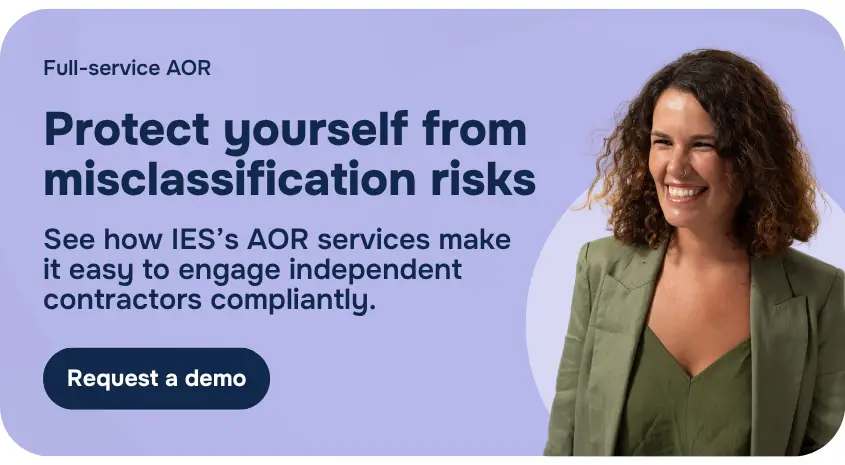Key takeaways:
- The freelance workforce is booming, but this growth brings heightened risk of worker misclassification, which can result in major penalties like fines, back taxes, lawsuits, and reputational damage.
- An Agent of Record (AOR) helps companies compliantly engage independent contractors by managing classification, contracts, onboarding, payments, and audit defense.
- AOR services reduce legal and administrative burdens by centralizing contractor oversight, ensuring compliance with changing labor laws, and protecting businesses from reclassification risks.
- IES provides full-service AOR solutions, offering region-specific risk assessments, defensible classification decisions, tax support, and compliance monitoring backed by decades of expertise.
The freelance workforce continues to expand. In 2024, 1.57 billion people people worked as freelancers — making up over 46% of the global workforce. But as businesses lean on independent contractors (ICs) to stay agile, they often face a major, overlooked risk: worker misclassification.
The misclassification of independent contractors can lead to fines, back taxes, lawsuits, and brand damage. The more you hire across states or borders, the murkier the distinction between contractor and employee becomes. That’s why more companies are turning to a solution designed to eliminate that ambiguity: the Agent of Record (AOR).
Engaging Independent Contractors vs. Employees: Why the Right Classification Matters
Before exploring AOR services, it’s critical to understand the difference between an independent contractor and an employee. This isn’t just about paperwork — it affects your legal obligations, tax responsibilities, and risk of noncompliance.
Across the U.S. and abroad, governments are increasing scrutiny around worker classification. Laws like California’s AB5 and the U.K.’s IR35, along with stepped-up enforcement by agencies such as the IRS and Department of Labor, mean that even unintentional misclassification can trigger audits, penalties, and legal action.
| Independent Contractor | Employee | |
| Control Over Work | Sets own hours/methods | Follows company direction |
| Tax Withholding | Responsible for own taxes | Employer withholds taxes |
| Benefits and PTO | Not provided | Typically provided |
| Risk of Misclassification | High if treated like an employee; low if properly classified | None |
The Costs of Misclassifying Independent Contractors
Misclassification isn’t a gray area — it’s a liability. Violations can result in:
- Government fines and regulatory penalties.
- Backdated payroll taxes and employer contributions.
- Wage-and-hour lawsuits and co-employment claims.
- Damaged reputation and public scrutiny.
Case in point: Uber agreed to pay $8.4 million to settle a class-action lawsuit over misclassifying California drivers. If it can happen to a global brand with a massive legal team, it can happen to anyone.
For smaller businesses, the financial fallout can be devastating. And the longer a misclassified worker remains on your books, the greater the risk. That’s why compliance should start from day one — and why many companies rely on an AOR’s compliance services to get it right.
What Is an Agent of Record (AOR)?
An AOR is a third-party partner who helps businesses engage independent contractors compliantly without taking on the legal, financial, or administrative risk themselves. While independent contractors manage their own work, taxes, and tools, it’s up to the business to ensure the relationship is handled correctly behind the scenes — and that’s where an AOR steps in.
The AOR acts as the official agent on behalf of the business to manage the entire contractor relationship from onboarding to payment and compliance. Here’s what that includes:
- Classification oversight: Evaluates each contractor engagement based on federal, state, and international standards to reduce misclassification risk.
- Contract management: Drafts and administers legally compliant agreements tailored to the role and location.
- Onboarding and offboarding: Handles documentation and workflows across jurisdictions for smooth contractor transitions.
- Invoicing and tax support: Processes payments, issues tax forms, and maintains clean financial records.
- Compliance reporting: Ensures all required filings and documentation are in place for government audits.
- Audit defense and indemnification: Maintains detailed audit files and shields your business from liability if a contractor is reclassified.
- Single point of contact: Centralizes communication and oversight for all contractor engagements, simplifying coordination and reducing risk.
The AOR isn’t just a paperwork processor — it’s a compliance partner who helps you properly engage independent contractors and scale across jurisdictions without the administrative and legal headaches. Companies rely on AOR services to:
- Evaluate engagement: Ensure every IC is classified accurately to avoid misclassification risks.
- Navigate complexity: Classification laws differ by region and are constantly evolving. AORs help businesses keep up and stay compliant.
- Reduce internal burden: From onboarding to invoicing, AORs take administrative tasks off your plate so your team can focus on growth.
- Lower legal risk: With audit defense, classification documentation, and indemnification, AORs help prevent costly compliance violations.
- Control costs: For companies without dedicated legal or HR compliance teams, partnering with an AOR is often more cost-effective than managing everything in-house.
AOR vs EOR: What’s the Difference?
So, how does an AOR compare to an Employer of Record (EOR)? Both help with compliance, but they serve different worker types:
|
|
AOR |
EOR |
Worker Type |
Independent contractors |
Employees |
Key Services |
IC classification, contract setup, invoice/payment processing |
Legal employer, employment contracts, payroll, benefits |
Compliance Focus |
Contractor classification |
Employment laws, payroll, benefits |
Risk Protection |
Misclassification defense, indemnification |
Employment law coverage, tax compliance |
Common Use Case |
Freelancers, SOW contractors |
Remote team or global workforce expansion |
How an AOR Delivers Compliance at Scale When Engaging ICs
The right AOR is a compliance partner who protects your business from the risks of worker misclassification. Innovative Employee Solutions (IES) offers full-service AOR solutions designed to eliminate misclassification risk and simplify contractor engagement. With five decades of industry experience and a global reach, IES supports every stage of the contractor lifecycle. Here’s what you get with IES:
- Classification Risk Assessments: Each engagement begins with a region-specific review based on local labor laws, tax authority guidance, and international compliance standards.
- Defensible Decisions: IES applies proven standards that have never been overturned in an audit or legal challenge.
- Contract and Onboarding Management: Tailored contracts, streamlined onboarding, and secure document handling.
- Payment and Tax Support: Timely invoice processing and end-of-year tax documentation.
- Audit Defense and Indemnification: A detailed audit file for each contractor — and protection if a reclassification occurs.
- Ongoing Compliance Monitoring: Insurance tracking and alerts for changing labor laws ensure your program stays compliant long term.
IES: Your Trusted AOR for Compliant, Risk-Free Contractor Engagement
Engaging independent contractors offers agility, but only if compliance is handled right. With IES as your AOR partner, you can scale your contingent workforce while reducing risk and simplifying operations. Speak to an expert and learn how IES can protect your business and your brand.
Sara Jensen is the Senior Vice President of Growth & Strategy at Innovative Employee Solutions (IES), a leading provider of remote and contingent workforce solutions, specializing in full-service global Employer of Record, Agent of Record, and Independent Contractor compliance services in the U.S. and 150+ countries. Founded in 1974, IES is a woman-owned business, certified by the WBENC and partners with companies to provide compliant employment solutions that empowers peoples’ lives.







